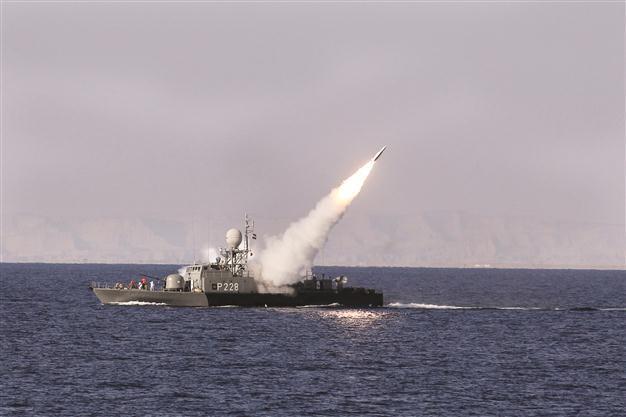Iran resumes missile show despite Western pressure
TEHRAN / PARIS

Iranian army officers react after succesful lunch of a ground-to-sea ‘Nasr’ cruise missile during the ‘Velayat-90’ naval wargames in the Strait of Hormuz in southern Iran on Jan 2. ABACAPRESS photo
Iran said yesterday it had successfully test-fired what it described as two long-range missiles, flexing its military muscle in the face of mounting Western pressure over its nuclear program.The announcement came at the culmination of 10 days of naval exercises in the Gulf, during which Tehran warned it could shut the Strait of Hormuz, where 40 percent of world oil is shipped through, if sanctions were imposed on its crude exports.
“We have successfully test-fired long-range shore-to-sea and surface-to-surface missiles called Qader (Capable) and Nour (Light) today,” Deputy Navy Commander Mahmoud Mousavi told state television. Despite his use of the term ‘long-range,’ the semi-official Fars news agency said they had a range of 200 kilometers. The Qader cruise missile “built by Iranian experts successfully hit its target and destroyed it,” Mousavi said, the IRNA news agency reported. He said it was “the first time” a Qader missile had been tested.
At its nearest point Iran is about 225 kilometers from Bahrain where the U.S. Fifth Fleet is based and about 1,000 kilometers from Israel. Its longest-range missile, the Sajjil-2, has a range of up to 2,400 kilometers. “The Strait of Hormuz is completely under our control,” Iran’s navy chief Adm. Habibollah Sayyari said following yesterday’s test. “We do not allow any enemy to pose threats to our interests.” The U.S. Fifth Fleet said it would not allow shipping to be disrupted in the strategic waterway.
France: Very bad signal
France said Iran’s testing of missiles was regrettable and reminded Tehran of the need to keep the vital oil transit waterway open. “We regret the very bad signal sent to the international community by these latest missile tests,” Foreign Ministry Spokesman Bernard Valero said, reminding Tehran of the “freedom of navigation in straits and the need to maintain a favorable climate in respect to this freedom.”
Valero said talks in the European Union regarding an embargo on Iranian oil imports “are progressing well.” A meeting of EU foreign ministers at the end of this month will decide whether to implement the measure. U.S. President Barack Obama also upped the pressure at the weekend, approving a law for new unilateral sanctions targeting Iran’s central bank and financial sector. “We consider the measures adopted this weekend by the United States go in the right direction,” Valero said.
Meanwhile, Iranian Parliament Speaker Ali Larijani said Iranian officials should not make hasty decisions about important issues in regard to national security. Officials should be well aware of the situation of national and international security in order to make the right decisions, Larijani said, according to the Iranian daily Tehran Times.
“What is important in the area of foreign policy is we accurately identify our country’s national interests and objectives in order to develop the means to achieve them and the diplomatic [apparatus] shoulders the responsibility,” Larijani said.
Given the complexity of diplomatic issues in today’s world, a country will make intelligent decisions only when it identifies its capabilities, he said. Doing this requires some professionals at the Foreign Ministry whose job is to research and study, he added.
Compiled from Reuters, AFP and AP stories by the Daily News staff.
















